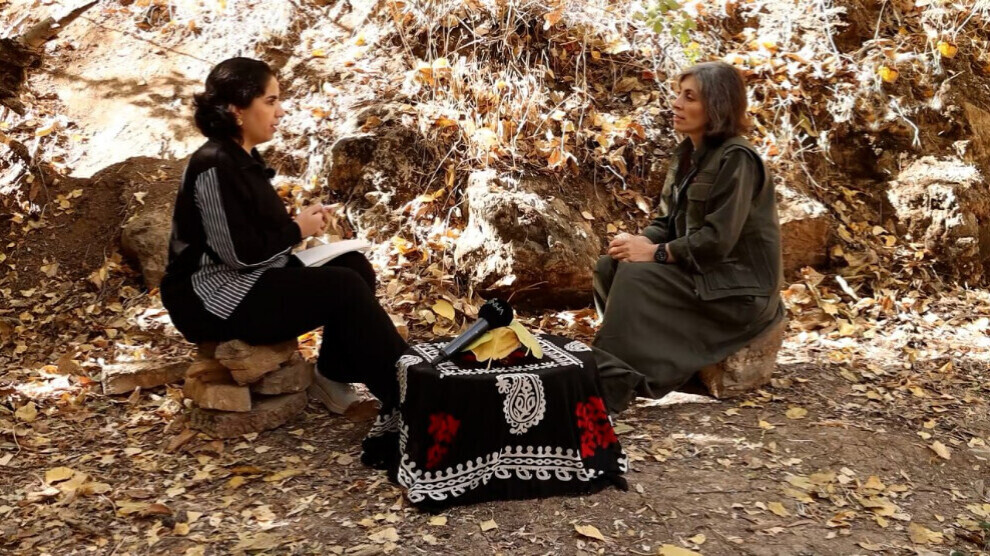Roken Nakhda: Women confronting Masculine and Colonial Mindsets
Roken Nakhda, member of the KJAR Coordinating Council, emphasized that rising violence against women originates from a patriarchal, authoritarian mindset reinforced by local and international policies, and can be countered only through unified, conscious

Shahla Mohammadi
Center News — With the International Day for the Elimination of Violence Against Women approaching, indicators of this violence are worryingly increasing at both the state and societal levels, including rape cases.
To investigate the causes of this dangerous rise in violence against women and the effective ways to counter it, our agency conducted an interview with Roken Nakhda, a member of the Coordinating Council of the Free Women’s System in Eastern Kurdistan (“KJAR”).
Regarding the rise of violence against women in the ongoing wars in the Middle East, Africa, and around the world, Roken Nakhda believes that this escalation results from a clash between two opposing mindsets: an authoritarian patriarchal colonial mindset and a liberatory feminist mindset. She explained that patriarchal systems, reinforced by governments, cannot tolerate the voices of women demanding freedom and sometimes resort to killing to silence them.
She pointed out that laws in Iran, under the Islamic Republic, grant legal protection to men who commit acts of violence, allowing many to escape punishment. Therefore, the roots of violence against women stem from state policies hostile to women, placing men in a position of impunity.
Nakhda emphasized that the path to liberation begins with women organizing themselves, affirming that resistance to authoritarian mindsets can only be achieved through collective awareness and unified strength. Without organization, it is impossible to confront a system that seeks to exclude women—and even nature—from public life.
On the question of whether women are the most vulnerable in wars, she stated:
“Despite the Middle East’s enormous wealth in oil, gas, and fertile lands, it has become a perpetual battleground due to the intervention of hegemonic powers such as NATO, the United States, and Israel, which aim to cement their colonial projects by keeping the region in poverty, instability, and violence. Under these circumstances, women are the primary victims of wars and crises.”
She explained:
“Women and children are targeted because of their resilience against occupation. Women are deeply connected to land, identity, and community, and rarely abandon their homeland. Occupiers resort to repressive measures such as sexual violence, abduction, and enslavement to break their will. The main goal is to destroy women, who are the cornerstone of society, thereby dismantling the social structure entirely.”
Regarding how women can combat patriarchal and gendered mindsets, Nakhda emphasized that organizing women against the patriarchal mindset is not merely an option but a necessity, as proven by the women’s revolution in North and East Syria. This experience demonstrated that women, by understanding the roots of the patriarchal system and uniting around the “Free Woman” philosophy inspired by Abdullah Öcalan, regained their leadership and organizational capabilities, becoming a powerful force in military, social, and political spheres across the four parts of Kurdistan.
She highlighted that the participation of women from various ethnic groups—Kurdish, Arab, Assyrian, Syriac, and Armenian—in the Women’s Protection Units (YPJ) created a unique model of resistance against occupation and patriarchy. Through organization in multiple arenas, women in North and East Syria defeated ISIS in Kobani, proving that women are capable of defending their land and leading society, making their experience a model to follow throughout the Middle East.
Nakhda stressed that women’s struggles worldwide are similar, and by drawing inspiration from the experiences of women in North and East Syria, studying Jinology, and building shared organizational structures, women can free themselves from male domination and violence, creating a more just and free reality.
Regarding the pivotal role women played in Iran during the Jin Jiyan Azadî uprising and the twelve-day war, and the violence they now face, she noted that over the past four years, as popular mobilization continues, Iranian authorities have intensified their repressive policies against women under a patriarchal authoritarian mindset that still refuses to recognize women’s rights and society’s democratic demands. “This system, unable to respond, finds no way to survive except through repression and violence, while women, through this movement, strive to build a democratic society, which the regime counters with increased killings and brutality.”
In this context, Nakhda praised the resilience of political female prisoners such as Zeinab Jalalian, Risha Moradi, Bekhshan Azizi, Sharifa Mohammadi, and others, affirming that they embody the voice of all Iranian women. “Their resistance inside prisons has become a symbol of women’s steadfastness,” she said. She added that women in Iran must organize, continue their struggle, and exert pressure on the regime to overturn unjust sentences and end the fabricated charges against these activists
